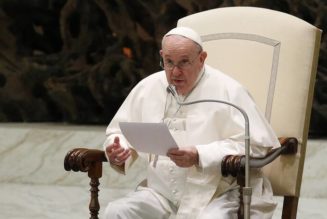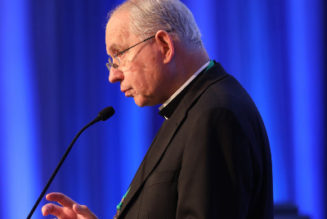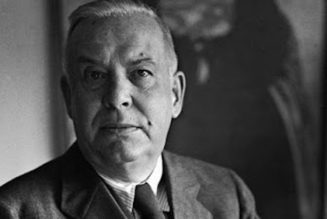In 1970, Michael Polanyi wrote an essay called “Why Did We Destroy Europe?” In it, he reflected on the cancerous spread of ideologies and war in the 20th century. He argued that scientific rationalism had initially “been a major influence towards intellectual, moral, and social progress.” But its chronic posture of skepticism and doubt undermined human reason itself and eventually bred a widespread nihilism. That nihilism had been weaponized by the false “scientific” theories of Marxism and National Socialism with murderous results.
Despite its achievements, scientific rationalism had, in effect, “become a danger to the spiritual conception of man.” And this “brought about the destruction of liberal societies over wide ranges of Europe.”
Throughout his books and essays, Polanyi—a Fellow of the Royal Society and an acclaimed physical chemist before turning to philosophy—warned that the real threat to modern humanity was a bizarre form of “moral inversion” fed by a crisis of reason. A convert to Christianity in his 30s, his thought was deeply influenced by the work of the early Church Fathers, especially Augustine and his famous words Crede, ut intelligas (“Believe, so that you may understand”).
For Polanyi, humans are made to seek the truth. All knowledge requires a framework of pre-existing belief to provide its coherence. Rejecting the traditional philosophical foundations of Western culture gives rise to a spiritual turmoil that science, technology, and prosperity can’t quell. And when the soul is deprived of truth, it turns to toxic substitutes.
Polanyi wrote safely from England during and after World War II. But a Polish contemporary of the Hungarian-born Polanyi suffered those “toxic substitutes” firsthand. His name was Karol Wojtyla. A priest by vocation and a philosopher by training, Wojtyla experienced both Nazism and Communism firsthand. And as Pope John Paul II, he engaged the modern crisis of reason in his now classic encyclical from 1998, Fides et Ratio (“Faith and Reason”), which marks its 25th anniversary this September.
John Paul wrote Fides et Ratio as a sequel to, and a further development of, his 1993 encyclical Veritatis Splendor (“The Splendor of Truth”). They’re closely linked. (If you missed my earlier piece on Veritatis Splendor, read it here). But in Fides et Ratio, the pope seeks especially to concentrate
. . . on the theme of truth itself and on its foundation in relation to faith. For it is undeniable that this time of rapid and complex change can leave especially the younger generation, to whom the future belongs and on whom it depends, with a sense that they have no valid points of reference. The need for a foundation for personal and communal life becomes all the more pressing at a time when . . . the real meaning of life is cast into doubt. This is why many people stumble through life to the very edge of the abyss without knowing where they are going. (FR 6)
John Paul’s target throughout his text is the challenge of post-modern cynicism. The key post-modern claim is that all truth is culturally constructed. “Absolute truths” are merely the products of a given cultural time and place, subject to critique and change. In this view, appeals to truth are often tools of the powerful, masked by sacred language, and used to subjugate minorities whose voices are smothered. In response, John Paul II argues that the search for truth is central to any genuinely human culture. The drive to understand the world and our place in it is one of the most basic human hungers. Truth is not the enemy of freedom but its foundation, since it gives us the capacity to love reality as it really is.
Looking back on the past quarter-century, Fides et Ratio is prophetic. Our social climate and public discourse—including our discourse within the Church—are now ruled by what the philosopher Alasdair MacIntyre calls “the morality of emotivism.” We implicitly rank feelings over careful judgment, “compassion” over truth, sincerity over facts, and authenticity to ourselves over collateral damage to others. Each person is free to think whatever he or she wishes about the universe, morality, personhood, religion (or the lack thereof), but only so long as each person avoids offending the sovereign space of others.
Of course, this standard is applied selectively. And it’s guided by norms of political correctness that reflect leadership-class agendas. The hymns we sing to tolerance are theatrical and superficial. At the heart of today’s emotivism is a paradox. Modern secular morality is based on individual autonomy. In theory, each person forges the meaning of life for himself. But this autonomy can only be exercised within a narrowly conformist framework: participation in the liberal secular market, with its typical consumptions and pleasures. Increasingly absent is the intellectual and moral discipline that comes from being formed within a community shaped by the classical virtues. Everyone is urged to develop an autonomous vision of one’s self, distinct from the herd. But each one is also pressed to conform to the opinions and behaviors of the herd. This leads inevitably to the culture of simultaneous egotism and groupthink paraded before us in our daily news feeds.
Fides et Ratio offers a remedy to this diseased individualism and the breakdown of common sense that precedes it. It does so first of all by underscoring the unity that exists between the search for truth and our capacity to love, between philosophical reason and intimate human communion. John Paul II was influenced by the thought of both Thomas Aquinas and Max Scheler, the 20th century German phenomenologist. He looks at philosophy then, both as a vital activity of the human intellect and in its concrete exercise as a dimension of human relationships.
When we search for truth, we seek to know the real nature of the universe. What is a human being? What does science tell us about the cosmos? How should we live in our bodies? Are there philosophical reasons for believing in God? What is the nature of beauty? Can we identify objective moral norms?
Concretely, the person who pursues such questions has a history of shared friendships, experiences, intuitions, loves and resentments, hunches and fears. These all condition our search for the truth. If we place too much stress on the abstract idea of “truth” without weighing its personal dimension, we risk using it as a weapon against others. In contrast, emotivism—with its veneration of feelings over “legalisms”—emphasizes the subjective elements of our search for the truth. But this, in turn, too easily misses a key point: We can only resolve our inner confusions about life by seeking the objective truth about things, and by exploring that truth with others who hold us accountable to reality. As John Paul states bluntly, “Truth and freedom either go together hand in hand or together they perish in misery” (FR 90).
Human beings are more fruitful and authentic in their relationships and inner lives when they know they’re bound by a truth beyond themselves. Fides et Ratio shows the connection between truth and human freedom. Knowing what’s true makes us free to be ourselves, to live for what’s real, and to appreciate the sacredness of others. True knowledge of persons leads to an expansion of human love. That’s part of any sound philosophy.
A key feature of the encyclical is its response to the central intellectual problem of our age: its bias against (or fear of?) transcendence. Human reason is naturally oriented toward exploring life’s deepest realities. We search for what is ultimate. We want to find the real origin of things. We ask why. This search leads us to the question of God. In the words of John Paul: “Wherever men and women discover a call to the absolute and transcendent, the metaphysical dimension of reality opens up before them: in truth, in beauty, in moral values, in other persons, in being itself, in God” (FR 83). But our modern rationality is often captive to a crippling kind of skepticism that imprisons us within the created world of politics, economics, and technology.
Another issue Fides et Ratio confronts is today’s crisis of truth within the Catholic Church herself. What happens to theology in the absence of a sound philosophy, one truly open to the mystery of the transcendence of God? Core doctrines of the Church become unintelligible to many Catholics. We try to wed Catholic belief to the latest cultural or political trends. Relevance eclipses substance. Catholics fall into the corrosive mode of thought we call “historicism.”
As John Paul II notes: “The fundamental claim of historicism… is that the truth of a philosophy is determined on the basis of its appropriateness to a certain period and a certain historical purpose. At least implicitly, therefore, the enduring validity of truth is denied. What was true in one period, historicists claim, may not be true in another” (FR 87). Under the pressures of this way of thinking, Catholic theology becomes simply a history of opinions: The Church used to teach this; then that; now another thing.
John Henry Newman taught that the development of Church doctrine is organic, so that later developments build on and preserve previous teachings in a continuity of meaning. Vatican II and the Council of Trent need to be read in relation to one another. Historicism in theology transforms this into a process of division or arbitrary change. And this in turn splits the Church, the body of Christ. The life of the Church slips into emotivism. In the name of being “pastoral,” the Church risks becoming merely indulgent, malleable, affective and practical; in effect, anti-intellectual.
Heading into an ambiguous “synod on synodality,” this is exactly the crisis we now face.
We live in a time when Christian truth is increasingly misunderstood, disdained, or simply unknown, even among baptized Catholics. Michael Polanyi would have recognized our culture’s contradictions and emerging shape, especially on our university campuses: a mix of “fierce moral skepticism [paradoxically] fired by moral indignation. Its structure is exactly the same as that of the moral inversion underlying modern totalitarianism”—i.e., a contempt for traditional morality, fused with and fueled by ferocious moralizing for social change. Rational consistency is irrelevant. Passion is its own justification.
Writing in the wake of Vatican II, the Italian Catholic philosopher, Augusto Del Noce, made three simple observations. First, our era is a “peculiar combination of the greatest perfection of means with the greatest confusion of goals.” Second, in the face of modern atheism—often less a hatred of God than a technology-driven indifference to him—“a large part of [today’s] religious thought, the quest for aggiornamento, simply means surrendering to the adversary.” And third, much of what styles itself as Christian progressivism, no matter how good its intentions, serves as the instrument of that surrender.
For Del Noce, the Church’s mission in every era is to bring the world into line with eternal principles while respecting the good in those things which are new. Progressivism does the “exact inverse, since [it seeks] to bring Catholicism into line with the modern world.” By lopsidedly stressing action over contemplation and politics over metaphysics, progressivism reduces the supernatural core of Christian faith to a system of social ethics—a kind of baptized, humanitarian chaplaincy to a world that doesn’t need or want it. The result is obvious. The proof, for Del Noce, would be the hollowed out national churches that now mark much of Europe. Germany is simply the most obvious example.
John Paul II spoke from the heart of the Church because he was both a rigorous thinker and deeply attuned to the Word made flesh, wisdom incarnate. The confusion that dogged the Catholic world in the years immediately after Vatican II emerged in part from the absence of that kind of rigorous intellect fused with a deep and sincere faith. John Paul did much to heal the confusion. But it has never entirely disappeared, and—regrettably—it’s alive again in the current pontificate with new and damaging force.
This is why the substance of Fides et Ratio remains so important—not just for scholars, but for all of us; for every Christian who turns to the Church for guidance and a path to eternal life. What we need now is a return to its fundamental principles.
Charles J. Chaput, O.F.M. Cap., is the archbishop emeritus of Philadelphia. This article is revised and adapted by the author from previous (2018) comments in First Things magazine.








